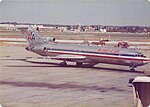Estádio França Ndalu
Buildings and structures in LuandaSport in LuandaSports venues in Angola
Estádio França Ndalu is an Angolan football stadium built and owned by Clube Desportivo Primeiro de Agosto and will be the venue for the club's home games in all events that it takes part of. The stadium is named after Gen. António França, nicknamed "Ndalu" who was a key figure in the club's foundation in 1977. The 20,000-seat stadium is located in the Cassequel neighborhood, Maianga district, Luanda, Angola. The stadium is only the second private-owned stadium in Luanda, following Interclube's 22 de Junho as the remaining teams based in the capital play in the state-owned 11 de Novembro and Coqueiros.
Excerpt from the Wikipedia article Estádio França Ndalu (License: CC BY-SA 3.0, Authors).Estádio França Ndalu
Avenida M. Alves de Pinho, Luanda Martires de Kifangondo
Geographical coordinates (GPS) Address Nearby Places Show on map
Geographical coordinates (GPS)
| Latitude | Longitude |
|---|---|
| N -8.8413028333333 ° | E 13.241706833333 ° |
Address
Estádio França Ndalu
Avenida M. Alves de Pinho
Luanda, Martires de Kifangondo
Luanda Province, Angola
Open on Google Maps





